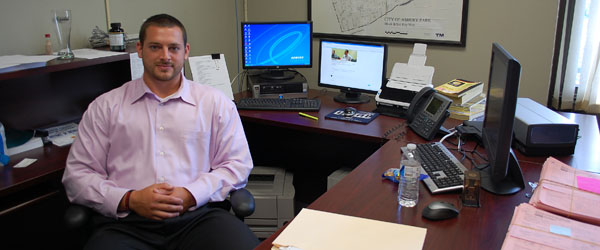Erick Aguiar, 26, was only one year old when his immediate predecessor Mary Lou Hartman was appointed as the city’s tax assessor 25 years ago.
Now he’s got the job, having taken over on July 23.
Aguiar [pictured above] is a graduate of Fairleigh Dickinson University and had previously worked as a chef. He studied hospitality management in college. He lives in Tinton Falls.
Although he has never worked in a paying position in a municipal tax assessor’s office, Aguiar is the product of a program among veteran Monmouth County assessors to mentor and train promising new assessors in the job, according to Matthew Clark, the administrator of the Monmouth County board of taxation.
“I figured it was time for a real job,” Aguiar said. “So I started studying for the [certified tax assessor] exam. I started doing internships, and here we are today.”
Aguiar interned two days a week for the past year and a half while he continued to hold down his full-time job as a chef. He interned for a company that conducts municipal property tax revaluations, as well as in the offices of veteran local tax assessors Bernard Haney of Neptune and Steve Walters who is an assessor in five Monmouth County towns.
In addition, Aguiar worked in Clark’s office at the county. The county board of taxation oversees the municipal assessors, and the assessors report to the board through Clark as administrator.
About eight years ago, veteran assessors agreed on a program to mentor interested assessor candidates as unpaid interns, Clark said.
“They get a full understanding of what it is to be a municipal tax assessor,” Clark said. “People can pass the test and be an assessor but they don’t know where to start. [The interns] can hit the ground running. They are extra well-prepared to be a competent assessor from day one.”
A tax assessor keeps the records of all the assessed properties in a municipality, and represents it in property tax appeals. Aguiar will also coordinate the city-wide property tax revaluation scheduled for the coming year. The last revaluation took place a decade ago.
“Everything is out of whack as far as the values go,” Aguiar said of the need for the revaluation. “There’s some assessments at 50 percent of the value of the property, while other stuff can be 10 percent of the value. It’s not fair to taxpayers. Person A could be paying a lot more than Person B when they have the same situation — the same house, the same property.”
“So it’s a necessary step,” he said. “People hear revaluation and they get scared. It sets the percentage of the town where it should be. Your taxes don’t necessarily go up when you get a revaluation.”
Aguiar’s annual salary is $62,500, according to city manager Terence Reidy.












